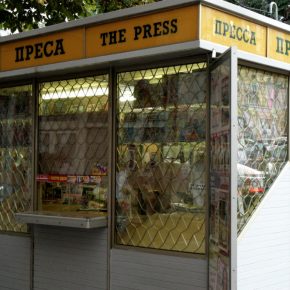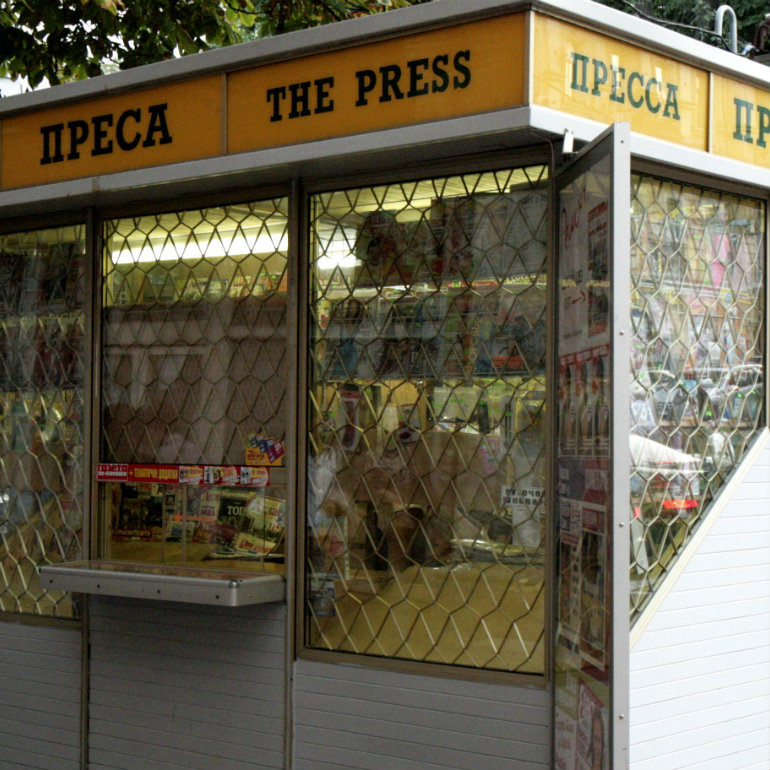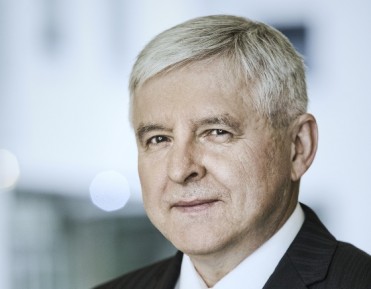Tydzień w gospodarce
Category: Trendy gospodarcze

In December 2015, journalists from the Ukrainian news service The Insider analysed the ownership of the most important mainstream media in Ukraine. Their conclusions were not particularly surprising: “In Ukraine there is no market of mass media. The vast majority of the media are loss-making businesses sponsored by industrial and financial or political groups. Only a small part of the media are trying to make a living from advertising revenue.”
Sergiy Kurchenko, an oligarch associated with former president Viktor Yanukovych, has owned the media company UMH – Ukrainian Media Holding – since 2013. It was previously owned by Boris Lozhkin – a business partner of President Petro Poroshenko and the head of his administration. The president, also an oligarch, held shares in the weekly “Korespondent” owned by the holding. UMH publishes “Forbes” (in 2015 the American company withdrew UMH’s right to use the title, but it is still published under the same name), “Korespondentˮ, “Futbol”, “Argumenti i fakti” and the daily “Komsomolskaya Pravda v Ukraine”. The company also owns radio stations AvtoRadio, Nashe Radio, Europa Plus, Retro FM, Radio Piatnica, Lounge FM, Golos Stolitsy and Jam FM.
Rinat Akhmetov, the oligarch associated with the Donetsk region , is the owner of the Media Group Ukraine, which includes the national television stations Ukraine, NLO TV, Indigo, Futbol1 and Futbol2 and the local television stations Telekanal 34 (Dnepropetrovsk), Donbass (Donetsk) and Sigma (Mariupol), as well as the Segodnya Multimedia group, which includes the journal “Segodnya”, the Ukrainian edition of “Vogue” monthly, the magazines “RIO”, “Donetskie Novostiˮ, “Priazovskiy Rabochiy” and “Dom Sovetov”. He also owns the websites Segodnya, Vecherniy Donetsk, Gorod, Priazovskiy Rabochiy and Donetskie Novosti.
The Inter Media Group is owned by Dmitry Firtash – Poroshenko’s political partner who is currently in Austria awaiting a decision on extradition to the United States in connection with corruption accusations filed by the US Justice Department – and Serhiy Lyovochkin, the former head of Yanukovych’s administration and an MP with the Opposition Block . The holding controls the Inter, NTN, Mega, K1, K2, Enter Film and Pixel television stations, as well as the websites Podrobnosti.ua and Ukranews.com as well as the Ukrainski Novini press agency.
Viktor Pinchuk, the son-in-law of former president Leonid Kuchma, owns the StarLightMedia holding (six television stations: STB, ICTV, Novyi Kanal, M1, M2, and QTV).
The Privat Group, controlled by Ihor Kolomoysky and Henadiy Boholyubov, is the owner of eight television stations: 1+1, 2+2, TET, PlusPlus, 1+1 International, Bigudi, the television channel of the Unian news agency (also owned by Privat) and the Ukraine Today station. Privat is also the owner of the large news websites TSN and Glavred.
Poroshenko has also maintained an influence on the media. In 2013 he sold a part of his shares in the media market and his assets were acquired by allies of Yanukovych,, but he remained the owner of the national news television station Kanal 5, and he also indirectly controls the state news agency Ukrinform. The agency is subordinated to the Ministry of Information Policy, led by Poroshenko’s ally Yuri Stec – who was previously the head of Kanal 5 and is also the godfather of the president’s child.
This ownership structure of the media is reflected in the quality of the Ukrainian debate, especially on economic topics.
With the mainstream media under the control of oligarchs, public debate shifted to social media. In the Russian-speaking regions there were three competing platforms: “Odnoklassniki”, the Russian equivalent of the Polish “Nasza Klasa”, which is taken with a grain of salt, the Vkontakte service (vk.com) designed by the Russian Pavel Durov, and Facebook.
Initially, Vkontakte dominated in Belarus and Ukraine. The situation changed dramatically in the spring of 2013, when the Russian “Novaya Gazeta” revealed that as early as 2011 the portal had been collaborating with the Russian Federal Security Service. The site’s employees not only blocked users posting views unacceptable to the authorities but also fabricated false user postings in order to provoke fights within the anti-Putin opposition.
In his correspondence with Vladislav Surkov, the deputy head of Russian President Vladimir Putin’s administration, which was disclosed by the journalists, Durov wrote: “We’ve been cooperating with the Federal Security Bureau and Department “K” of the Ministry of Internal Affairs for many years, transferring information about thousands of users of our network in the form of IP addresses, cell phone numbers and other data,” arguing he was acting to “prevent the spread of violence and chaos.” The report caused many users to move to Facebook.
Ukraine’s Facebook boom began in autumn 2013, during the Euromaidan protests. The American social media service became the main center for the exchange of information. Today it is mainly on Facebook that we can find Ukrainian economic experts absent from mainstream media, learn about drafted legal acts, read confidential analyses and opinions, or obtain credible economic data.
The leaders of the economic debate usually have thousands of followers, but there are some who can boast figures reaching tens of thousands or more followers. MP Jehor Sobolev, chairman of the Parliamentary Committee on Preventing and Combating Corruption, has an audience of 114,000 people.
Yury Kasyanov, who deals, among others, with the finances of the Ukrainian army and the defense industry, has 63,000 followers, and Yulia Marushevska, the head of the State Fiscal Service in the Odessa Oblast has 30,000.
A lot of analysis now appears on Facebook, for example changes in the fiscal services announced by the Ministry of Finance – recently discussed on the site of the chairman of the Committee of Economists of Ukraine Andriy Novak. Taisa Haida, one of the leaders of the Automaidan movement, which grew out of the protests against Yanukovych, who has already received death threats and is under constant surveillance of the security services, publishes reviews of the data from the regions showing the scale of Ukrainian corruption and the ruling party’s real attitude towards it.
Haida ‘s Facebook posts discuss , among others, that the Luhansk Oblast was excluded from the ProZorro electronic system of public procurement, acclaimed as a way of combating corruption, which will make it easier to defraud billions in financial aid for the reconstruction of the Donbass that has been promised by the West.
Vadim Triukhan, head of the European Movement Ukraine, reports from the regions on how the crisis and the government’s policies affect Ukrainian agriculture. Yury Kasyanov, organizer of a team of volunteers building drones used by the Ukrainian military in the Donbass, publishes documents from the government and the prosecutor’s office showing how almost 200,000 hectares of forests located on army training grounds were removed from military control and prepared for logging.
Also on Facebook, Oleh Lyashko , leader of the Radical Party, reveals data concerning the Ukrainian army’s order for the purchase of trucks, not from the Ukrainian factory KrAZ, as was the case so far, but from Belarus, and the effects of this decision on the Ukrainian economy and on Poroshenko’s wallet. He also reports on his conversation with the deputy head of the National Anti-Corruption Bureau, showing that, contrary to the promises made to Western partners, the bureau is not conducting any investigations against representatives of the current government involved in the Panama Papers scandal.
The economist and political scientist Taras Zahorodny analyses the chances of newly appointed Wojciech Balczun, a Pole, as the head of the Ukrainian railways. Jehor Sobolev, chairman of the Parliamentary Committee on Preventing and Combating Corruption, recounts conversations with American congressmen, senators, as well as officials from the US State and Defense departments concerning corruption in the Ukrainian army,. Andrei Klymenko, from the think-tank Maidan of Foreign Affairs, reveals new details about the maritime economy of occupied Crimea.
There are many more examples, as the social network is the place for debates not held in anywhere else in Ukraine.
The government, however, isn’t idle in the Facebook information war. In addition to an army of online trolls modelled on Putin’s Olgino and known in Ukraine as “porokhobots” – a compound of the president’s surname and the English word “bot” – allegedly organized by the Ministry of Information Policy, established in autumn 2014 to counter the Kremlin’s propaganda. Poroshenko and his entourage also make use of more serious figures –so-called opinion leaders. From time to time the independent media receive leaks on the briefings that the head of state organizes for the most important of them and the hundreds of thousands of dollars spent on their activities.
Independent Ukrainian media have described in detail the structure and relations of the “internet army” acting on behalf of the ruling oligarch on Facebook.
The future of “porokhobots” was brought into question when a scandal broke out in early April over Poroshenko’s companies registered in tax havens and concealed from citizens. As Informator reports, quoting its own government sources, Borys Lozhkin and Oleksiy Filatov (head and deputy head of the presidential administration – MK) gathered them and forced them to account for the failed campaign of whitewashing Poroshenko. It turned out that they had known about the planned disclosure of the offshore scandal beforehand, but missed its publication but were not able to adequately prepare for it and to react to it. Lozhkin criticized them for the failed job, imposed financial penalties and fired some of them.
The real reasons why the Ukrainian economic debate has moved to Facebook is best illustrated by the recent scandal involving “Shuster Live,” the most popular Ukrainian political talk show, produced by Savik Shuster, a Russian emigrant with Canadian citizenship,. After he was expelled from Moscow in 2004 – where he hosted a program on the NTV station – for criticizing the Putinization of Russia, the journalist found refuge in Kiev. In Ukraine the “Shuster Live” show, which was repeatedly accused of “selling out”, has for a long time been virtually the only place where economists and economic experts independent of the oligarchic systems, as well as activists from social organizations, openly and publicly debated with politicians about the direction of Ukraine’s development and the reform of its economy. The program’s author himself admitted that he “sells himself”; however, even the critics concede that by “selling himself” to everyone all at the same time, Shuster has created a platform on which the full spectrum of the Ukrainian political life is represented.
At the end of April, the State Employment Service (DPS) suddenly cancelled the journalist’s work permit, which would force Shuster to close his show. Many voiced the opinion that the actions of the office were illegal – the State Employment Service reported letters from the Ukrainian fiscal service about tax proceedings conducted there as the basis for cancellation of the permit. There are doubts as to the sequence of events, the legality of the actions of the officials, the speed with which they were conducted, and the official reasons for the initiation of proceedings in which Shuster served as a witness.
His production company was accused of giving its program away to the state television Pershiy Nacionalniy virtually for free (the national television station paid Shuster UAH 12 per episode, whereas after the program was moved to Firtash’s Inter television station, the production studio sold the show for UAH 400,000 per episode). The fiscal service concluded that Shuster’s studio should pay VAT on the difference in the price paid by Inter and state-owned television.
At the same time Shuster was accused of “evading the payment of income tax.” In 2008 he took out a mortgage in Cyprus to buy a house in Italy, which the Ukrainian tax service deemed an income on which he should pay taxes in Ukraine.
In accordance with Ukrainian law, a work permit can be cancelled only in the event of submission of false information concerning a previous criminal record, and in order to be recognized as a convicted person, a final judgment of the court is required. This did not stop officials from the State Employment Service – even though Shuster presented a certificate of no criminal record issued by the Ukrainian Ministry of Internal Affairs, he still lost the right to work in Ukraine.
Even the OSCE spoke in his defense. “The circumstances of this case raise a number of concerns and questions. I urge the Ukrainian authorities to swiftly look into this matter, making sure that the journalist’s rights are safeguarded and that Shuster is allowed to continue performing his work in a free and safe manner,” commented Dunja Mijatović, the OSCE Representative on Freedom of the Media.
As a result, after a few days the State Employment Service suspended its decision until a final clarification of the matter.


